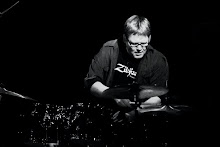I know, I know, I don't phone I don't write. Hopefully now that school is back on I'll be able to get into more of a schedule.
I wanted to talk briefly about mental practice. We play an instrument that is hard to get at sometimes and/or creates volume that doesn't blend with other people"s lives. Should we give up? No way! We can do what many athletes do (who are often limited by the amount thier bodies can tolerate practice), we can practice in our heads. I have been doing this for many years now and found it extremely beneficial. First I'll describe how I approach it, and then I'll discuss some of the things I've gained from it.
First I close my eyes and picture my instrument as clearly as I can. The colour of the drums, the perspective from where I sit, any dings or scratches etc. Next I take anything I want to work on and start imagining how it would sound. The pitch of the drums, the timbre of the cymbals etc. For someone new to this, you might want to take a very simple idea to strive to get the visuals and sound very clear in your head. Try maybe thinking of double strokes hand to hand, or something like that. Also imagine what the movements you make feel like in your muscles, but try not to move your body at all and just stay as relaxed as you can. Do this for as long as you can concentrate on it. It might be only for a minute or two to start, but that's fine. Like everything else we practice, it'll improve the more we do it. Sound flakey to you? We'll let's look at some of the pluses,
1) It allows us to feel loose and relaxed on the instrument when we haven't been able to physically play it. I can't tell you the number of times I've spent practicing in my head on a long flight or drive ( please don't do this while your driving, we don't need anymore tragic musician stories!) and feel refreshed and ready to play when I finally get to the gig.
2) It allows us to really hone what we want our sound/feel/physical approach to the instrument to be. If we can imagine what our drums and cymbals sound like in our heads, we can take that mental sound image with us wherever we go, and bring it to whatever drums we play. We can also rehearse what we want our physical relationship to the drums to be, even if we're only "virtually" there to start. I developed a much more relaxed style and rid myself of some issues regarding tendonitis mainly through my imagining a much more relaxed me at the drums.
3) It allows us to get away from always thinking of our instrument in a physical way. I've thought of certain combinations of instruments. ideas, etc. during mental practice that I never would have stumbled upon at the drum set. In fact, sometimes I imagine myself playing physically impossible things such as fast tempos, quintuple stops, etc. and these things have helped me feel a greater sense of the possible at the drums. even though I can't play some of the things I imagine.
So next time your stuck at a bus stop, have a free period at school (but no drums), or even have insomnia, check out imagining the great drummer you're going to turn into. You'll be very impressed by the results, I'm sure!

Interesting stuff. I'm a later started to the drums, or born-again perhaps, so I'm keen on working smart to make up for lack of experience. (Also been looking at 'inner game' techniques).
ReplyDeleteAnyway, it's called visualisation, and as you say, athletes use it. I also came across it in rock climbing, where you'd visualise yourself succeeding on a difficult move before you did it.
http://en.wikipedia.org/wiki/Creative_visualization
I meant 'late starter', doh!
ReplyDeleteThanks for the comments!
ReplyDelete